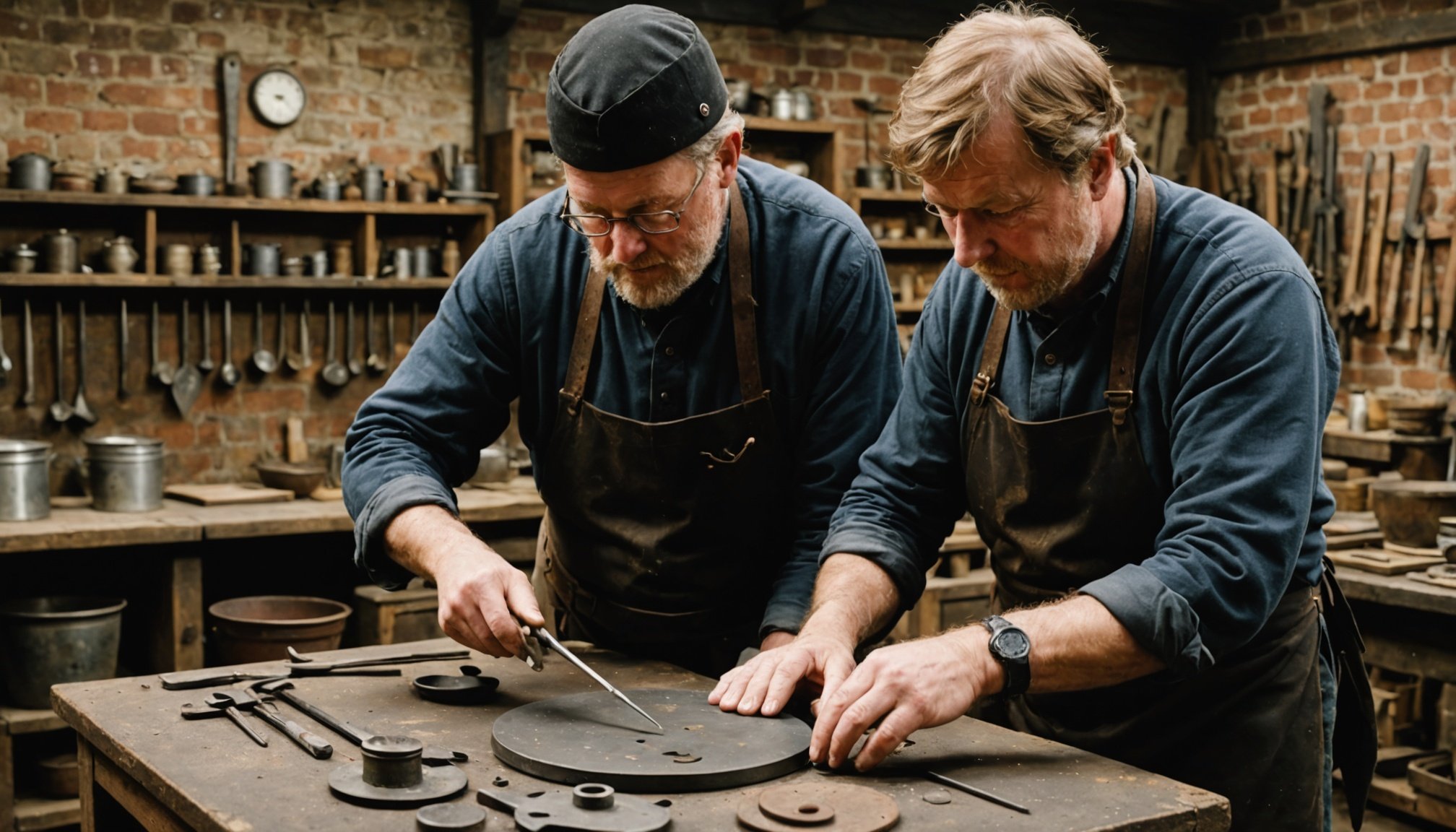Overview of British Metalcraft Traditions
British metalcraft boasts a rich tapestry of history and cultural heritage, deeply embedded in its traditional artistry. Its historical significance is evident through centuries, reflecting Britain’s industrial evolution and diverse craftsmanship. Metalcraft not only showcases technical skills but also subtle artistry, intrinsic to British identity.
Historical Significance
From the Saxon period to the Victorian era, metalwork has played a pivotal role in British cultural heritage. The metallurgical advancements during these times underscored economic achievements and artistic developments. Iron, silver, and pewter were commonly used, each with unique properties that artisans leveraged for different purposes.
Also read : Discover Top UK Spots for Engaging Guided Tours in British Aviation History
Key Techniques and Materials
Traditional techniques include casting, engraving, and repousse. Casting allowed intricate designs to be mass-produced, while engraving added personal flair. Repousse, a method of shaping metal with hammering techniques, resulted in highly detailed, raised designs. Each technique utilized specific metals, contributing to the distinctiveness of British metalwork.
Regional Traditions
Different regions in Britain are known for specific metalcraft traditions. Birmingham, known as “The City of a Thousand Trades,” excelled in industrial metalcraft. Meanwhile, Durham specialised in ecclesiastical silverware. These regions, among others, continue to preserve and celebrate their unique metalworking traditions, contributing to Britain’s overall cultural richness.
Also to see : Discover Top UK Destinations for Guided Tours that Reveal the Intriguing History of British Folk Medicine
Notable Tours and Experiences
For those eager to dive into the world of British metalcraft, there are ample opportunities through guided tours and artisan workshops. These offer the chance to interact directly with centuries-old traditions brought to life by expert artisans. Many popular tours focus on specific regions known for their unique metalworking heritage, providing immersive experiences that go beyond mere observation.
Tours often include hands-on workshops where participants can try various techniques like casting or engraving, guided by skilled craftsmen. This gives a newfound appreciation for the traditional artistry involved. Visitors frequently share anecdotes of their enriched understanding and satisfaction upon completing these immersive experiences. Such feedback is an indication of how deeply these activities are cherished and valued.
Several top tours invite participants into the studios of celebrated artisans, offering a close-up look at their work and creative processes. These experiences are invaluable as they provide insight not only into the skill required but also into the dedication needed to preserve these artistic traditions. Through such interactions, tourists gain a profound connection to Britain’s rich cultural heritage, making their visit truly memorable and enlightening.
Profiles of Renowned Artisans
Exploring the world of British metalcraft often leads enthusiasts to the workshops of expert artisans known for their extraordinary craftsmanship. These exceptional individuals serve as custodians of traditional artistry, breathing life into centuries-old techniques and creations.
Artisan Name 1
Artisan Name 1 is celebrated for their mastery of British metalcraft, bringing a unique perspective to the field. With a background enriched by years of dedicated practice and innovation, this artisan’s expertise is showcased through their work on ecclesiastical silverware and intricate engraving. Notably, their pieces are often displayed in prestigious galleries and sought after by collectors who cherish British cultural heritage. Visitors frequently engage in interactions with Artisan Name 1 during tours, gaining insight into both the technical precision and artistic flair that define their craft.
Artisan Name 2
With an impressive repertoire, Artisan Name 2 has made significant contributions to the realm of traditional metalwork. This artisan is famed for their exceptional skill in repousse techniques, creating highly detailed and lifelike depictions on metal surfaces. Those who have visited Artisan Name 2’s studio often recount the personalised guidance and engaging workshops offered, leaving an indelible impact and deepening their appreciation of the craft.
Essential Locations for Metalcraft Enthusiasts
Those passionate about British metalcraft will find several key locations that provide a deep dive into this rich tradition. Metalcraft studios across various regions showcase centuries of craftsmanship, making them vital stops for any enthusiast. Birmingham stands out with its abundance of workshops and live demonstrations, rooted in its history as “The City of a Thousand Trades.”
In the northeast, Durham boasts studios specialising in ecclesiastical metalworks, reflecting its significant cultural heritage. While there, visitors can engage with artisans who exemplify traditional artistry, often demonstrating techniques like casting and engraving. These workshops offer personal interactions and unique insights into the traditional craftsmanship prevalent in the area.
Moreover, cultural sites such as museums provide a broader perspective on the historical and artistic contexts of metalwork. At many of these, one can see an array of metalcraft pieces ranging from medieval artifacts to contemporary designs. Each site serves not only as a celebration of local talent but also as a reminder of the enduring spirit and impact of British metalcraft on cultural identity. These locations are integral in preserving the tradition while educating future generations.
Practical Information for Tourists
For visitors eager to explore British metalcraft, understanding how to plan your visit enriches the experience. Navigating booking details is simple through platforms specializing in cultural tours; these provide comprehensive schedules and rates. Secure your spot in desired artisan workshops or tours well ahead, especially during peak seasons.
It’s advantageous to consider travel tips for a seamless journey. Opt for comfortable, practical attire suitable for hands-on activities. Engaging in these experiences often involves active participation, providing a closer look at traditional craftsmanship.
Crafting a balanced itinerary ensures you cover pivotal locations. Start in Birmingham to witness the industrial artistry, then proceed to Durham for ecclesiastical wonders. Each region offers unique insights, making a circular route both practical and enlightening.
Most tours offer flexible schedules, accommodating various durations and interests. These allow tourists to dive deeply into specific metalcraft aspects, enhancing their cultural heritage understanding. Be prepared for a richly immersive trip by allocating sufficient time for each location.
Providing feedback post-visit helps these services continue thriving. Many tourists highlight their satisfaction with the tour logistics, reflecting the invaluable experiences these enrich.
Cultural Significance of British Metalcraft
The cultural significance of British metalcraft is deeply interwoven with the nation’s identity, as it reflects centuries of tradition and craftsmanship. This form of art is not merely a demonstration of skill but a celebration of history and innovation intertwined. Metalcraft has played a pivotal role in expressing social values and community traditions, offering insights into the past while showcasing enduring techniques.
British metalcraft is renowned for its intricate designs that reflect cultural identity and heritage. From ceremonial silverware to industrial metal objects, these creations encapsulate societal shifts and technological progress. Such artifacts serve as tangible connections to Britain’s historical narrative, underscoring its rich artistic legacy.
Throughout local communities, metalcraft remains a vibrant part of social customs and events. This traditional art fosters a sense of belonging and continuity, emphasizing local pride and collective memory. As each region boasts its unique styles and methods, the cultural landscapes of metalworking are both diverse and significant.
Looking towards the future, the preservation of British metalcraft hinges on sustained efforts. Initiatives focusing on education, conservation, and innovation are crucial in ensuring these timeless traditions continue to flourish and adapt to contemporary contexts.


